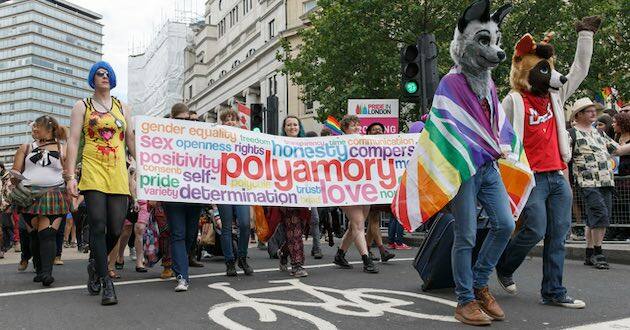Polyamory and the ‘Next Sexual Revolution’ That Has Been Here for Years

On January 23 I posted on X, “Five days ago @MattWalshBlog wrote, ‘This is now the fourth article in a major media publication in the span of one week pushing ‘polyamory.’” Today, the @WSJ noted that ‘polyamory is having a moment.’ Perhaps this article that I wrote in 2012, called, ‘The Next Sexual Revolution Has Arrived,’ focusing on polyamory, deserves another read?”

In my 2015 book Outlasting the Gay Revolution, “polyamory” occurred 23 times and “polyamorous” 6 times. I also pointed how American views on polygamy were changing. Not surprisingly, in 2022, an article in the Harvard Law Review titled “Three’s Company, Too: The Emergence of Polyamorous Partnership Ordinances” that stated that, “According to a Gallup poll, since 2006, there has been a fourfold increase in the number of Americans reporting that polygamy is morally acceptable — from five to twenty percent.”
Let’s go back, then, to 2012. The polyamory “moment” has been here for quite some time.
The Next Sexual Revolution Has Arrived
In July, 2009, Newsweek ran a feature article on “relationships with multiple, mutually consenting partners,” entitled, “Polyamory: The Next Sexual Revolution.” Last week, Showtime launched a reality TV show called “Polyamory: Married and Dating.” To quote from Newsweek’s 2009 article, it’s “enough to make any monogamist’s head spin.” And all this, of course, is being touted as a great thing, a celebration of love and freedom, a deliverance from the monotony and constraints of monogamy.
The Showtime promo pulls no punches and makes no excuses:
Narrator: The polyamorous lifestyle may shock some. But with American divorce rates hovering around 50 percent, these families are on the front line of a growing revolution in the traditional monogamous relationship.
Michael: I want people to know it’s okay to live a life this way, it can be good. Because it is. It’s beautiful. We love it.
Jennifer: I want people to know that monogamy isn’t the only way.
Vanessa: If it were socially acceptable, I think there would be way more poly people.
Tahl: It feels like how we really should all be living.
Natalia Garcia, director: I really believe that a lot of people are going to watch this show and their jaws are going to drop. And they’re also probably going to wonder, Am I poly?
Narrator: Follow two not-so-typical families –
Kamala: Mommy and Daddy are going to ask Jen and Tahl to come and live with us. How would you like that?
Kid: Yeah. I like ‘em.
Narrator: – that are changing the way America thinks about love.
Yes, it’s all about who we love, a statement we’ve heard before – repeatedly – in another context. Perhaps President Obama needs to allow his views on marriage to “evolve” just a little bit more? After all, don’t all Americans have the “right” to be with the person (or persons) they love?
According to the official blurb, “This provocative reality series takes an inside look at polyamory: non-monogamous, committed relationships that involve more than two people. Lindsey and Anthony are married, but live in a triad (three-way relationship) with their girlfriend, Vanessa. Husband and wife Michael and Kamala have many lovers, including couple Jen and Tahl.”
Tahl, for his part, cites this lengthy quote from Amy Thornton as expressive of his views: “A lot of people say no to more love. Why? Well (IMHO) the number one reason is they don’t love themselves. It’s the first place that people say no to more love. After that comes the perception of ownership and control in relationships. The…mentality is my partner is mine, and I don’t have to share. If I share I might lose what I have. Which of course is silly, you can always lose what you have, or what you think you have. People don’t know that though, and they aren’t taught to believe otherwise. It’s ridiculous conventional wisdom that few choose to challenge. Anyway, since that’s true, therefore I am willing to give up getting more love for myself so that I don’t have to share. There is also a perceived idea of lack, that there isn’t enough to go around. The silly idea also persists that there is one true love for everyone… …that’s the short version according to me.”
READ: How the church changed the world’s view on marriage
And to think: Some of us have been stuck in the stone age of monogamous marriage for decades. We could have been so free! In the words of one of the reality show’s stars, “Monogamy destroys family. . . . I feel liberated.” Chew on that for a while: “Monogamy destroys family.” (This sounds a bit like Dan Savage, who said, “people in monogamous relationships have to be willing to meet me a quarter of the way and acknowledge the drawbacks of monogamy around boredom, despair, lack of variety, sexual death and being taken for granted.”)
To be sure, it is not just Showtime that is pushing polyamory. In January, ABC News ran a TV spot entitled “Polyamory: 1 Mom, 2 Dads, and a Baby,” while a January report on the BBC carried the claim that “Polyamorous relationships tend to be ongoing, sustainable, emotionally bonded, committed relationships with more than one person, with the knowledge and consent of everyone involved.”
But it is Showtime which has taken the lead, as the Polyinthemedia website announces: “The series will break new ground in introducing modern polyamory to a mass audience. Nothing like this has ever appeared on television. (Sister Wives and Big Love come from a very different place of religious patriarchal polygamy.)” To quote Newsweek again, “the traditionalists had better get used to it.”
According to estimates cited in Newsweek, there are more than half-a-million people in America living in polyamorous relationships, and if this is true, it won’t be long before the “progressives” among us will be calling for our children’s textbooks to reflect even more family “diversity.” (“Heather Has Two Mommies” is sounding quite passé.)
Of course, this is not Showtime’s first bold foray into the front lines of the sexual revolution. The network was already (in)famous for pioneering shows like “Queer as Folk” (2000-2005) and “The L Word” (2004-2009), all of which verifies what polyamory advocate Jasmine Walston stated in 2004, “We’re where the gay rights movement was 30 years ago” – and they’re catching up rapidly.
And there’s no slippery slope?
Photo: Wikimedia Commons
Creative Commons Attribution-Share Alike 4.0






